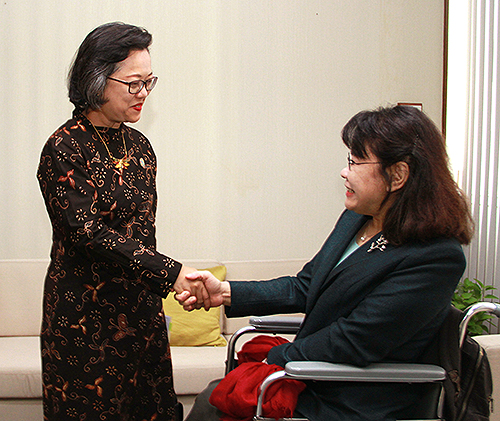
Zhang Haidi (R), chairwoman of the CDPF, shakes hand with Armida Salsiah Alisjahbana, executive secretary of the United Nations Economic and Social Commission for Asia and the Pacific, in Bangkok, capital of Thailand, on Nov 27. [photo/cdpf.org.cn]
Zhang Haidi, chairwoman of the China Disabled Persons' Federation (CDPF) and president of Rehabilitation International (RI), met with Armida Salsiah Alisjahbana, under-secretary-general of the United Nations and executive secretary of the UN Economic and Social Commission for Asia and the Pacific (ESCAP), at ESCAP's headquarter in Bangkok, capital of Thailand, on Nov 27.
Zhang, who is also deputy director of the State Council Working Committee on Disability, briefed Alisjahbana on the latest achievements made by China in the development of undertaking for people with disabilities and put forward constructive proposals concerning future cooperation between the CDPF and ESCAP.
The Chinese government attaches great importance to the affairs of people with disabilities, and has implemented the objectives and targets set out in the United Nations Convention on the Rights of Persons with Disabilities and the 2030 Agenda for Sustainable Development and taken concrete measures to improve their lives, said Zhang.
Both the Chinese government and the CDPF have maintained sound and fruitful cooperation with the UN, proactively responding to and showing support for its initiatives in relation to the cause of people with disabilities, according to she.
For instance, the Chinese government and ESCAP jointly organized the High-level Intergovernmental Meeting on the Midpoint Review of the Asian and Pacific Decade of Persons with Disabilities (2013-2022) in December 2017 in Beijing. The international conference adopted the Beijing Declaration and Action Plan, which created a comprehensive framework of policies and provided countries and other stakeholders in the region with clear guidance in the building of an inclusive society for the development for people with disabilities.
Zhang mentioned the efforts made by China to build a big data system for people with disabilities, formulate a subsidy system to provide for the living expenses of people with disabilities in need and pay the nursing costs of persons with severe disabilities. She also remarked on China's new rehabilitation university now in development and its harvesting of 2019 RI Awards for Outstanding Achievements.
There is still a huge challenge for the international community to achieve equal and inclusive development for people with disabilities, especially the elderly and women and children living in poverty. She proposed to promote the UN to set up a special agency such as the World Disability Organization in a move to better advance cooperation between national governments and international organizations for people with disabilities, accelerate the realization of all set objectives in the UN Convention on the Rights of Persons with Disabilities, and help the disabled live better lives since it is the common aspiration of people from across the world.
Zhang said any support for that initiative by ESCAP and any constructive ideas ESCAP may have would be most welcomed.
Alisjahbana gave high praise to the achievements of China in development of the undertaking for people with disabilities and the important role played by Zhang in the promotion of international affairs concerning disabled persons in the Asia and Pacific region.
China has provided other countries in the region with reference in the building of a database for people with disabilities and the coverage of social security, said Alisjahbana, who added that China's rehabilitation university is highly anticipated.
Alisjahbana stressed that the ESCAP is willing to further strengthen its cooperation with China and work together for the early realization of inclusive development for people with disabilities in the Asia and Pacific region.